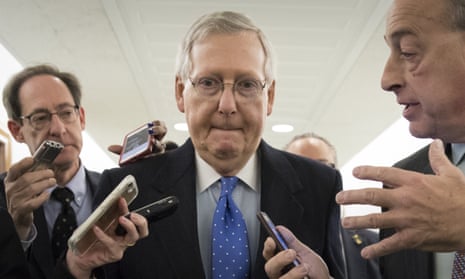Senate Republicans are scrambling to corral votes for a sweeping overhaul of the US tax code, eyeing a vote on Friday with changes to the bill expected overnight.
Republican leaders had initially hoped to advance their bill on Thursday. But a nonpartisan analysis released hours ahead of a planned vote compounded the late-stage drama by projecting the Republican tax plan would add $1tn to the federal deficit over the next decade.
Republicans had contended the vast tax cuts enclosed in their plan would in effect pay for themselves through economic growth. But the analysis, released by the congressional joint committee on taxation, forecasted the tax bill would balloon the deficit even after factoring in the economic growth the bill is expected to generate.
Senate Republicans are using a vehicle known as “budget reconciliation” to pass the tax plan using a simple-majority vote, leaving them room for only two defections.
As several Republican lawmakers continued to express an array of concerns, the Senate majority leader, Mitch McConnell, said late on Thursday that there would not be another vote related to tax reform until 11 am Friday.
The Republican plan promises $1.5tn in tax cuts, which many independent analysts say would overwhelmingly benefit corporations and the wealthy.
On Wall Street, the Dow Jones industrial average hit another record high on the prospect of tax cuts, pushing past the 24,000 mark for the first time to close 1.4% higher at 24,272.35.
Republicans in the House of Representatives passed their own tax reform legislation this month. If the Senate succeeds in passing its own plan, differences in the two bills would have to be reconciled before a final round of votes – presenting further hurdles in the coming weeks.
While no Republican senators have formally come out in opposition to the tax plan, as many as nine members have publicly voiced concerns over the bill in its current form.
Among the issues was a so-called “trigger” mechanism that would automatically raise tax rates after a certain number of years if economic growth proved insufficient. In a dramatic twist on Thursday, three Republicans withheld their votes for more than one hour on the Senate floor after learning that the trigger did not comply with budget rules.
Senators Bob Corker, Jeff Flake and Ron Johnson demanded assurances that there would be further changes to the bill if they voted against a Democratic amendment that would have sent the plan back to committee.
Corker and Flake, self-proclaimed deficit hawks, had tied their votes to the trigger mechanism and wanted an agreement that changes would be made to offset the deficit, while Johnson bargained for fixes related to the corporate tax rate.
After the tense showdown, McConnell suspended votes for the evening and announced that the chamber would reconvene on Friday, as Republicans were left to search for a way to offset the deficit by hundreds of billions of dollars.
Earlier on Thursday, Republican Senate leadership had expressed confidence that their tax plan would pass by the end of the week. But with a 52-48 majority, McConnell has little room for error.
“We are on the cusp of a great victory for the country,” McConnell said at an event with small business owners on Thursday morning.
Less than one hour later, the Republican senator John McCain of Arizona announced that he intended to vote in favor of the tax plan. McCain, whom colleagues viewed as a wildcard because of his tendency to buck leadership, said he was satisfied the tax plan went through “regular order” in the Senate.
McCain acknowledged in a statement that the tax plan was “not a perfect bill” but said he ultimately determined it would “deliver much-needed reform to our tax code, grow the economy, and help Americans keep more of their hard-earned money”.
Meanwhile, Senator Susan Collins, a Republican from Maine, said she remained concerned by the impact of the bill’s proposed repeal of the Affordable Care Act’s individual mandate and the ability for taxpayers to deduct certain state and local taxes. However, Collins said she was optimistic after multiple discussions with GOP leadership and the president that both issues would be addressed.
“Still, I am not committed to vote for this bill, because who knows what is going to happen on the Senate floor,” Collins told reporters at a breakfast hosted by the Christian Science Monitor.
Republican leaders were nonetheless bolstered by the support of McCain, who over the summer thwarted efforts to dismantle the healthcare law in dramatic fashion.
Democrats seized on the report by the joint committee on taxation as proof that the Republican tax plan was not what they promised it would be: a middle-class tax break that would pay for itself.
Holding a copy of the report, Senator Ron Wyden, a Democrat from Oregon, said the analysis proved the bill was nothing more than a “holiday bonanza to multinational corporations and special interests”.
Meanwhile, Senator Bernie Sanders, an independent from Vermont, kicked off a 24-hour rally to protest against the Republican tax plan.
Expectations are soaring for the Republican party, which, despite controlling both chambers of Congress and the presidency, has yet to produce a single major legislative accomplishment this year.
Donald Trump has called for a tax bill to reach his desk by the end of December, vowing to deliver a “big, beautiful Christmas present” to Americans.
The president and Republican lawmakers already suffered a series of embarrassing blows this year by failing on multiple occasions to repeal and replace Barack Obama’s healthcare law amid opposition within their own party.










